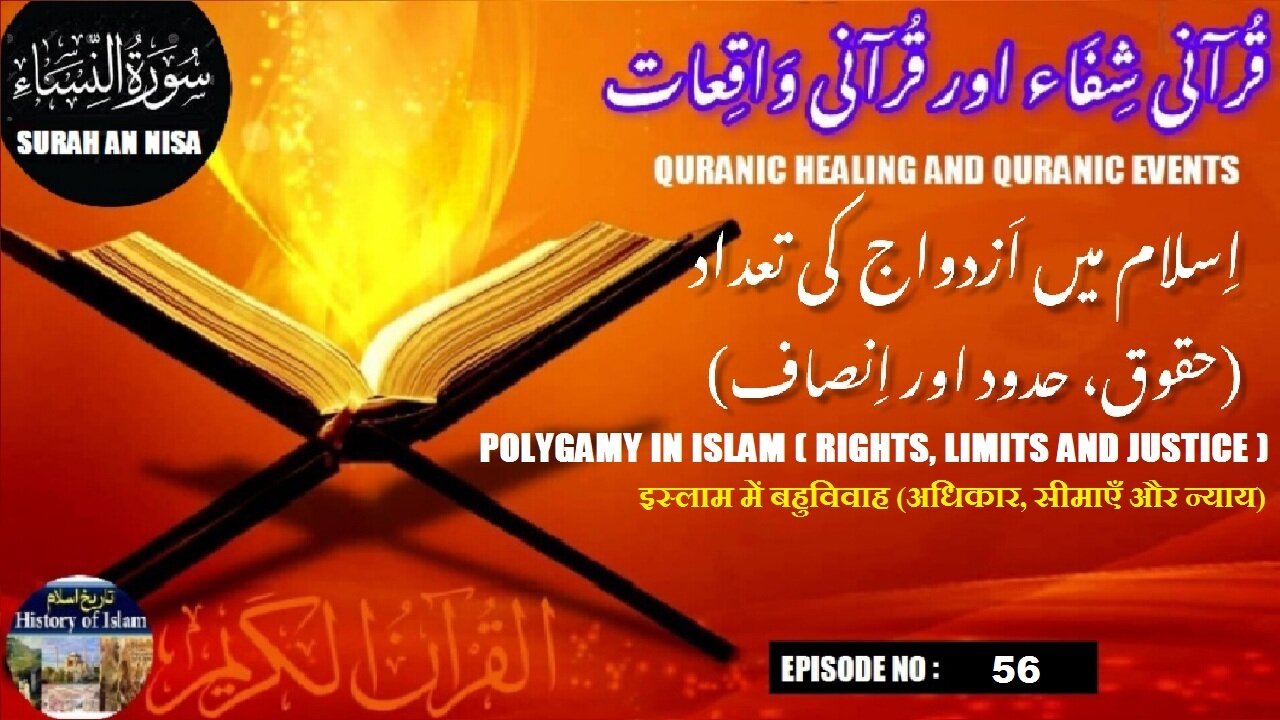Premium Only Content

Polygamy in Islam {Rights, Limits and Justice} اسلام میں تعدد ازدواج { حقوق، حدود اور انصاف}
@islamichistory813 #polygamy #islam #rights #limits #justice,#healing #and #events #from #the #quran #historical #stories #and #events #quranicstories #selfhealing #success #stories #striking #events #in #history #quranstories, #storiesfromthequran #quran #historical #loves #religious #creation #stories #trending #short # #historical #heroes #what #is #true #strength #calm #quran #recitation #for #babies #islamic #healing
Polygamy in Islam: Rights, Limits, and Justice, Surah An-Nisa (4:3)
Assalamu Alaikum, wa Rahmatullahi wa Barakatuhu.
Brothers, sisters, friends and elders, we are presenting the 56th episode of the Islamic informative video based on healing and events from the Holy Quran, and in this episode we will describe,Polygamy in Islam: Rights, Limits, and Justice, Surah An-Nisa (4:3)
Quranic Marriage and Family Laws: Marry Women Lawfully – Up to Four, With Justice (Surah An-Nisa 4:3)
Islamic marriage and family laws are designed to build a just, balanced, and compassionate society where human dignity is upheld, particularly for women and families. One of the foundational verses addressing marriage is **Surah An-Nisa (4:3)**, where Allah says: *“Then marry those that please you of \[other] women, two or three or four. But if you fear that you will not be just, then \[marry only] one...”* This verse outlines the conditions under which polygamy is permitted in Islam, while simultaneously setting strict ethical limitations to prevent injustice and exploitation. It also establishes that marriage must always be lawful, transparent, and rooted in fairness. Contrary to common misconceptions, this verse does not promote unrestricted polygamy but instead imposes a system of moral accountability in marital relationships, especially to protect women and orphans who were vulnerable in the society of early Islam.
The background of this verse is deeply linked to social reform. In the aftermath of battles in early Islamic history—such as the Battle of Uhud—many Muslim men lost their lives, leaving behind widows and orphans with no means of support. The Qur'an responded to this crisis by addressing both the rights of orphans and the societal need for responsible marriage. Surah An-Nisa 4:3 opens with a command to treat orphans fairly and then transitions to polygamy, making it clear that any allowance of multiple marriages must come from a place of justice and responsibility—not desire or abuse of power. It teaches that marriage in Islam is not simply a personal right but a social contract with serious ethical implications.
The phrase “marry lawfully” is critical. Lawful marriage in Islam requires mutual consent, a declared contract (nikah), dowry (mahr), and the fulfillment of responsibilities from both partners. Women are not to be taken as wives in secrecy or through coercion. This lawful approach protects the honor and rights of women, ensuring that they are respected as equal partners. The permission to marry “two, three, or four” must also be read with the condition that follows immediately—“but if you fear that you cannot do justice, then \[marry only] one.” This clause reflects the Quran’s deep concern for fairness and its recognition of human limitations. The underlying principle is that **justice is mandatory**, and if a man cannot provide equal treatment in time, wealth, affection, and care to more than one wife, then he must remain monogamous.
This verse, therefore, is not an encouragement for men to take multiple wives arbitrarily, but rather a structured legal option for specific social circumstances, provided it is carried out with absolute fairness. Throughout the Qur’an, justice is a central value, and this includes justice in the family. If polygamy leads to favoritism, neglect, or emotional harm to any wife, then it violates the spirit of the Quranic command. In fact, **Surah An-Nisa (4:129)** later reinforces this point by saying, *“You will never be able to do perfect justice between wives, even if it is your ardent desire...”* This serves as a warning and a reminder that true justice is extremely difficult, thereby pointing believers back toward monogamy as the default and safest option for most.
Furthermore, the Qur'an consistently promotes the ethical treatment of women and family members. Women are given the right to their dowry, financial maintenance, emotional respect, and freedom to accept or refuse marriage proposals. The Prophet Muhammad (peace be upon him) himself set an example of monogamy for most of his life and treated all his wives with fairness, wisdom, and kindness. His conduct is the gold standard for Muslims, and his household reflected the Quranic ideals of compassion, communication, and equity.
In modern times, the verse is often misinterpreted or misused, especially outside Islamic legal frameworks. It is important to understand that Islamic family law is not meant to be applied selectively or without proper knowledge. The permission for polygamy is not a license for abuse, but a responsibility-heavy exception with social, financial, and spiritual obligations. Islam views marriage as a solemn covenant and places tremendous weight on how spouses treat one another. The rights of wives are protected by law, and the abuse of polygamy is condemned by scholars when it results in injustice.
In conclusion, **Surah An-Nisa (4:3)** lays down clear and balanced marriage laws rooted in justice and ethical responsibility. It acknowledges the realities of society, offers practical solutions, but surrounds them with strict conditions to prevent harm. The core message is one of fairness, lawful conduct, and protection for women and orphans. The Qur’an urges believers to uphold family ties with integrity, to marry responsibly, and to avoid causing harm through unjust or careless relationships. These laws are not just rules, but divine guidance meant to ensure that the foundation of the family is built on love, justice, and the fear of Allah.
With this, we ask for your permission until tomorrow and pray to Allah Almighty to grant us the ability to act on the Quran and Hadith, Amen
Allah Hafiz
============================
-
 12:36
12:36
ISLAMIC HISTORY
12 hours agoIslamic History Episode 243 Beginning of Samania दौलत-ए-समानिया की शुरुआत دولت سا ما نیہ کی ابتدا
5 -
 1:24:56
1:24:56
Glenn Greenwald
4 hours agoTrump Declares Cities as the Enemies Within; Reagan Appointed Judge Slams Trump Over Speech Crackdowns; American ER Doctor on Gaza Atrocities | SYSTEM UPDATE #524
73.7K75 -
 LIVE
LIVE
I_Came_With_Fire_Podcast
10 hours agoPete Hegseth and the Chamber of Standards | Digital IDs | Taiwan Chips & Salsa | CDL Crisis
173 watching -
 LIVE
LIVE
Adam Does Movies
10 hours agoTalking Movies + Ask Me Anything - LIVE
23 watching -
 29:11
29:11
Nick Shirley
2 hours ago $0.14 earnedPortland has Fallen... ANTIFA Take Control of City
1475 -
 1:19:00
1:19:00
VapinGamers
2 hours agoJump Space - We All Scream in Space - Early Access - !rumbot !music
63 -
 LIVE
LIVE
Joker Effect
1 hour ago(Kick) Streamers Have Ruined The Streaming Landscape and Here is How! Reviewing Phase Partners...
525 watching -
 3:46:40
3:46:40
The Blood Lust Gaming
4 hours agoClair Obscur: Expedition 33 - LVL 1 challenge run pt.3
37 -
 2:11:38
2:11:38
Nikko Ortiz
3 hours agoPTSD Is Fun Sometimes | Rumble LIVE
9.35K1 -
 1:02:40
1:02:40
BonginoReport
4 hours agoA Florida Man Attempts a Jussie Smollett Hoax - Nightly Scroll with Hayley (Ep. 146)
118K61